Eastern Europe
Ukraine LGBTQ group co-founder details harrowing escape from Kyiv suburb
Helen Globa arrived in New York on March 6
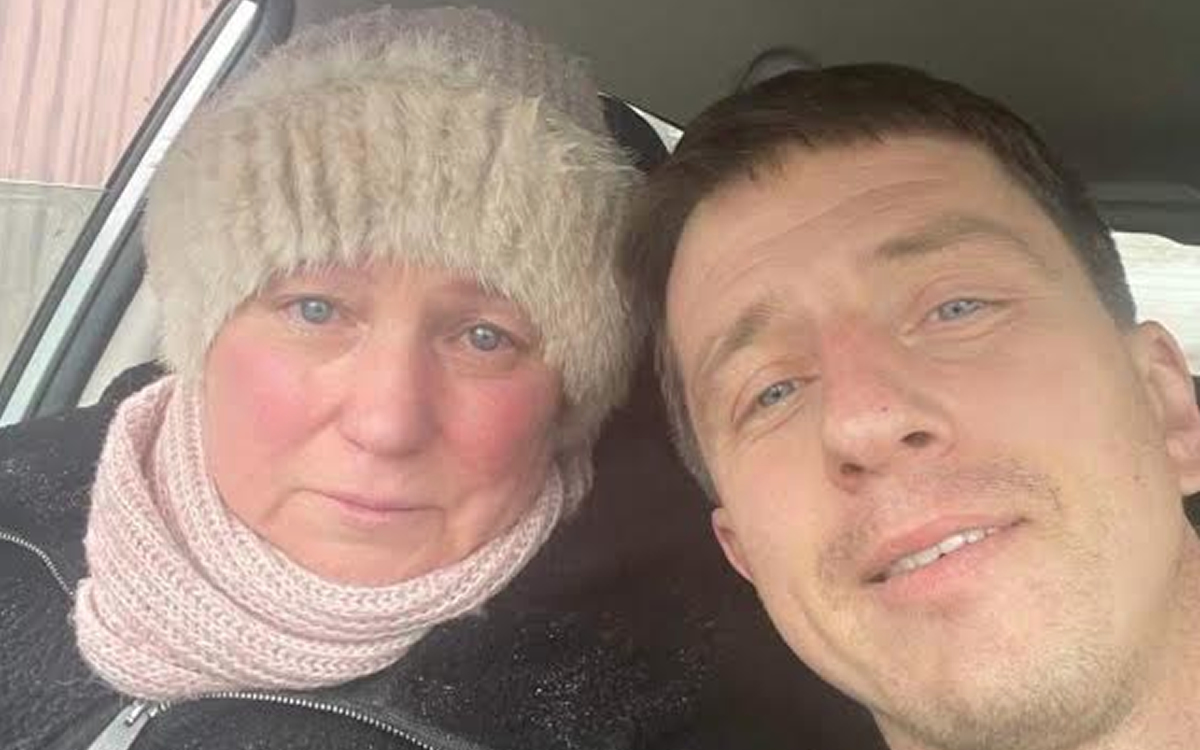
Helen Globa, co-founder of Tergo, a support group for parents and friends of LGBTQ Ukrainians, was in her apartment in the Kyiv suburb of Bucha on Feb. 24 when Russia invaded her country.
Globa and her neighbors sought refuge in a makeshift bomb shelter in their apartment building’s basement. Globa’s son, Bogdan Globa, who lives in New York with his husband, Harmilee Cousin, told her to leave on March 2 because her diabetes had caused her health to deteriorate.
Helen Globa rode her bicycle to a bridge that Ukrainian soldiers had blown up in order to stop Russian tanks from using it. Her son’s friend met her on the other side.
“I was afraid of sliding down into the river,” Helen Globa told the Washington Blade on Monday during a telephone interview. “The stress empowered me, and I managed to cross the bridge.”
Helen Globa said Ukrainian soldiers greeted her on the other side of the bridge.
“I was very happy to meet them,” she said. “They were men who you could rely on, who you could trust. I was crying when they instructed me how to behave in case if I heard some shooting or some bullets flying or maybe even some bombings.”
“I was crying,” added Helen Globa. “It was the first time during these seven days because when I was hiding in my basement, I wasn’t able to eat or to think about anything, or cry.”
Her son’s friend drove her to the Hungary-Ukraine border the next day. A man from Munich drove her and two other people to Budapest.
Helen Globa spent the night at a hotel near the Hungarian capital’s main train station. She told the Blade that she was afraid to leave her room, even to get something to eat.
“During those bombing days in Bucha, I guess I acquired some nervous disorder,” said Helen Globa.” Even in Budapest when I was in a safe place, when I was in a quiet place, in the evening I had a strong feeling of fear, unreasonable fear.”
Helen Globa on March 6 flew from Budapest to Paris’ Charles de Gaulle Airport and reunited with her son and Cousin.
“I said to them, ‘Guys, you saved my life,'” said Helen Globa.
The Globas and Cousin flew to New York on March 6. Helen Globa is currently living with a PFLAG family in Manhattan.
“I wish to go (back to Ukraine) tomorrow if I could,” she told the Blade. “My heart is with Ukraine.”
“I have a kind of guilt that I am not with them, that I do not have a gun, that I am not fighting, that I am not cooking for Ukrainian soldiers,” added Helen Globa.
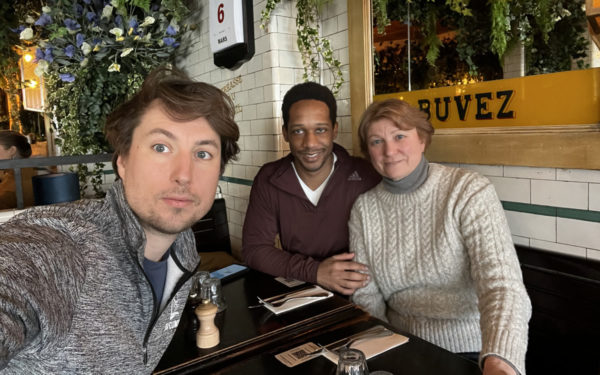
Helen Globa is one of the more than 4 million Ukrainians who the U.N. Refugee Agency estimates have fled the country since the war began.
The Biden administration last week announced it would welcome up to 100,000 Ukrainian refugees into the U.S. The White House has indicated it will prioritize LGBTQ people and other vulnerable Ukrainians.
Jessica Stern, the special U.S. envoy for the promotion of LGBTQ rights abroad, earlier this month told the Blade that she and her office continue to provide support to advocacy groups in Ukraine and in countries that border it. A State Department spokesperson on Tuesday noted to the Blade in response to a request for comment about LGBTQ Ukrainian refugees and reports of transgender women unable to leave the country that “our international organization partners are surging staff to focus exclusively on the protection needs of the most vulnerable fleeing Ukraine.”
“The United States supports Ukrainian organizations that work in Ukraine with vulnerable populations, and where necessary, is supporting efforts to facilitate the ability for many of these vulnerable groups to safely exit Ukraine,” said the spokesperson.
A Russian airstrike in Kharkiv, Ukraine’s second-largest city that is less than 30 miles from the Russian border in the eastern part of the country, on March 1 killed Elvira Schemur, a 21-year-old law student who was a volunteer for Kharkiv Pride and Kyiv Pride. A group of “bandits” on the same day broke into the Kyiv offices of Nash Mir, an LGBTQ rights group, and attacked four activists who were inside.
Helen Globa said one of her group’s members who fled to Lviv, a city in western Ukraine that is close to the country’s border with Poland, is volunteering at a shelter for LGBTQ Ukrainians. Other Tergo members have sought refuge in other parts of Ukraine or have left the country.
“People tried to escape to any safe places that they could find,” said Helen Globa.
‘Third World War has started’
Helen Globa throughout the interview praised Ukrainian President Volodymyr Zelenskyy.
“Zelenskyy is the first president I’m in love with, I’m deeply in love with,” she said.
Zelenskyy last November pledged his country would continue to fight discrimination based on sexual orientation and gender identity after he met with Biden at the White House. Letters that Congressional LGBTQ+ Equality and Ukraine Caucuses sent to Secretary of State Antony Blinken before the war began note that Ukraine in recent years “has made great strides towards securing equality for LGBTQ people within its borders and is a regional leader in LGBTQ rights” that include a ban on workplace discrimination based on sexual orientation and gender identity and efforts to protect Pride parades.
Helen Globa told the Blade that she is among the Ukrainians who had previously criticized Zelenskyy, but she added “right now I admire how this person acted, what he said to people, how often he talked to Ukrainians, what he said and how brave he is.”
“He’s a very courageous president,” said Helen Globa. “The whole country is around him.”
She said she supports calls for a no-fly zone over Ukraine. Helen Globa also praised the speech that Biden gave in Warsaw on March 26 in which he said Russian President Vladimir Putin “cannot remain in power.”
“Biden is pretty sincere and he vocalized his position,” said Helen Globa. “He was absolutely right and I share this opinion that Putin is a criminal and a humanitarian criminal and Putin shouldn’t stay as the leader of the country any more.”
Helen Globa, whose brother and his family live in the Russian city of St. Petersburg, also categorized the war as World War III.
“The administration and Biden should understand and they shouldn’t be like I was at the beginning of the war,” she said. “I didn’t believe the war could start. Biden shouldn’t also lie to himself. The administration shouldn’t also lie to themselves. The Third World War has started.”
Eastern Europe
LGBTQ Ukrainians bear brunt of psychological toll amid ongoing war
Saturday marks two years since Russia invaded country
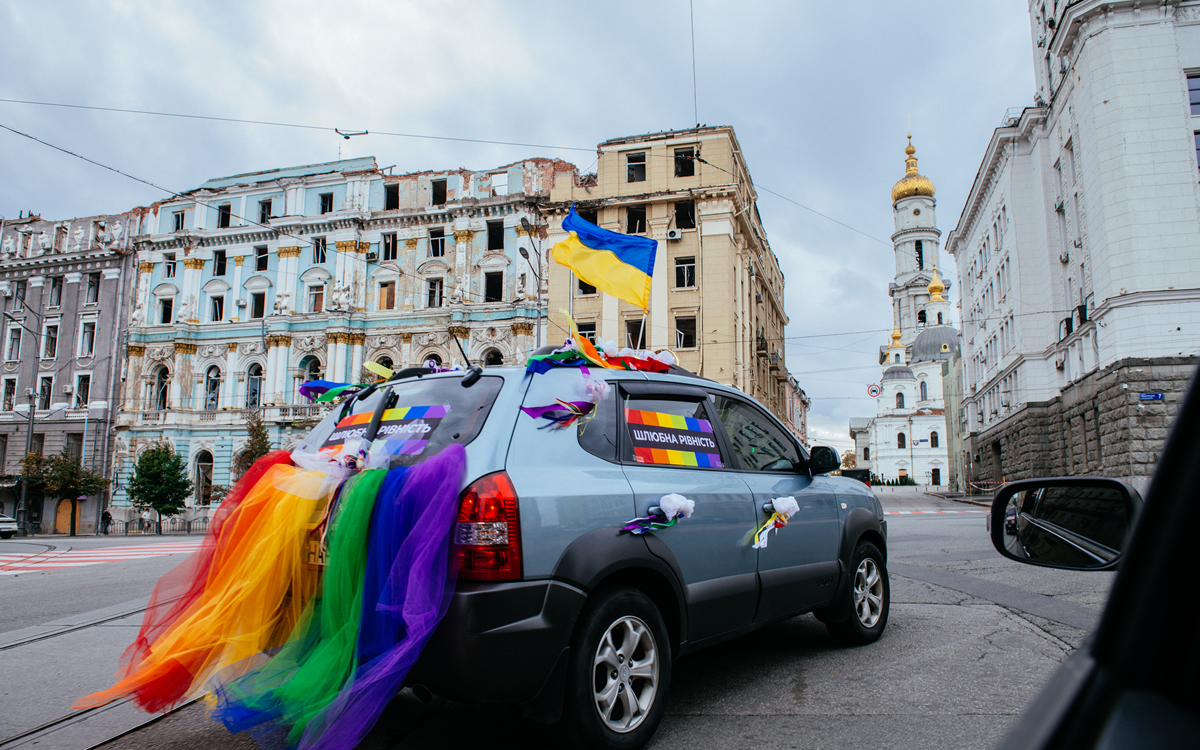
As Ukraine weathers Russian missile attacks and endures a harsh winter, the psychological consequences on its LGBTQ community are emerging as a distressing and often overlooked aspect of the conflict.
Recent reports from Human Rights First, based on their visits to the northeastern Ukrainian region of Kharkiv, shed light on the profound emotional impact experienced by LGBTQ individuals amid the sustained Russian aggression.
Saturday marks two years since Russia’s full-scale invasion of Ukraine began. Throughout this time, Human Rights First has sought to bring human rights into the heart of the discussion surrounding the conflict, offering support to human rights defenders, activist organizations, and individuals profoundly affected by the war.
Human Rights First last November initially surveyed Kharkiv to understand how communities were preparing for the harsh winter. Returning last month they found the LGBTQ community faced not only the physical challenges of extreme temperatures but also the hidden harm of severe psychological distress.
Human rights defenders on the forefront were documenting war crimes and supporting marginalized communities, including LGBTQ individuals. They emphasized the critical need for specialized psychological support within this community.
Vasyl Malikov, a key figure in Kharkiv-based LGBTQ NGOs Alliance.Global and Spectrum Women’s Association in Kharkiv, spoke about the increasing requests for psychological assistance and counseling.
Malikov highlighted the urgent need for both psychologists and a more comprehensive education about mental health and trauma issues.
“Some counseling can be done online, and it’s better than nothing, but what’s really needed is face-to-face time with a psychologist. Of course, that’s resource-intensive,” Malikov said, underscoring the unique challenges faced by the LGBTQ community.
Associate Professor Taras Zhvaniia, collaborating with Alliance.Global, shared insights into the growing demand for psychological support within the LGBTQ community. Initially addressing trauma in children, the scope expanded to include adults grappling with anxiety, depression and other emotional challenges related to the ongoing conflict.
Zhvaniia detailed the psychological struggles unique to the LGBTQ community, ranging from anxiety and panic attacks to specific fears such as reluctance to sleep in beds at home, avoiding bomb shelters and apprehension about routine activities during shelling.
Efforts to increase psychological knowledge for the general population are underway, yet the escalating demand for LGBTQ-focused support outpaces available resources. Human rights defenders have proposed measures, including funding for online counseling and visits by foreign psychologists, specifically tailored to address the psychological impact on the LGBTQ community.
The silent struggle faced by the LGBTQ community in Kharkiv and beyond necessitates international attention, according to Human Rights First. The organization added the lack of adequately trained psychologists raises concerns about the unaddressed psychological impact, underscoring the urgency for U.S. officials and the international community to comprehend and respond to the unique challenges faced by LGBTQ individuals in the midst of the ongoing conflict.
Eastern Europe
LGBTQ community in Kharkiv braces for another winter at war
Ukrainian city is 30 miles from Russian border
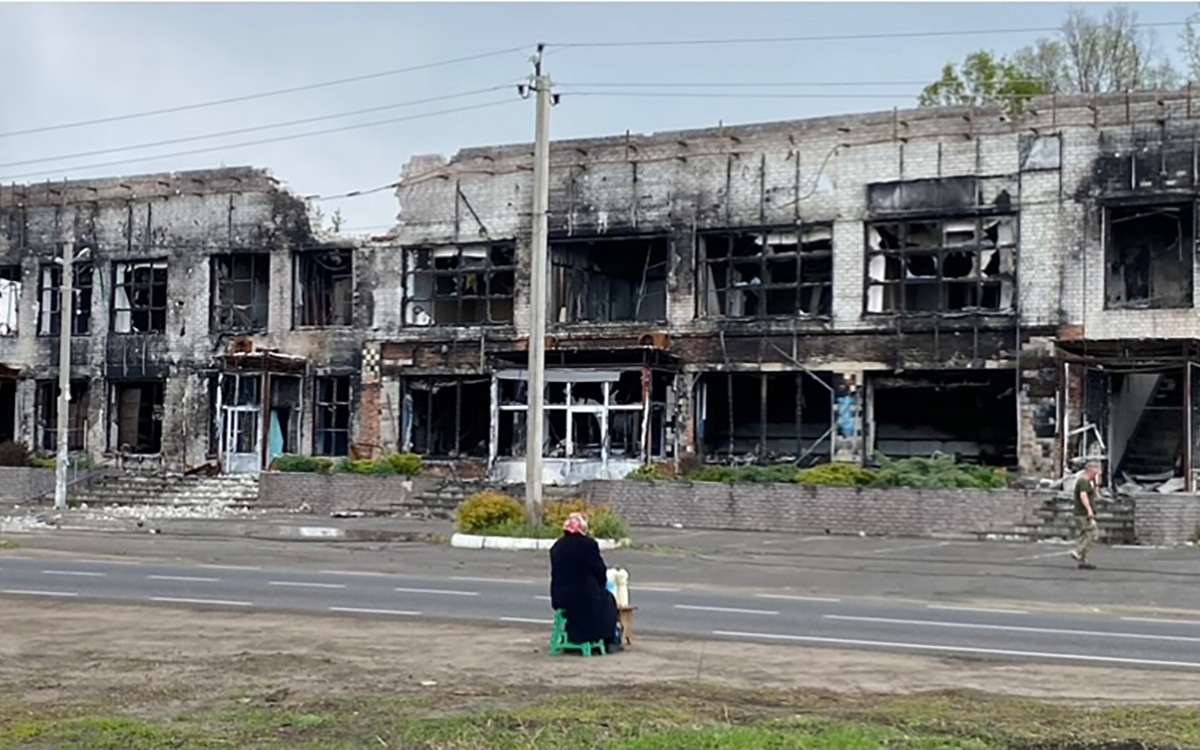
KHARKIV, Ukraine — Only 30 miles from the Russian border, Kharkiv is Ukraine’s second biggest city and was a key target of Russia’s invasion in February last year, when it was almost encircled.
I have been reporting regularly from Kharkiv since last year’s full-scale invasion, and the city is still often bombed by Russian missiles. United States government officials rarely come here because of the security situation. As temperatures plummet, Russia is targeting Ukraine’s heating infrastructure.
It hopes to make life unbearable for people in Ukraine’s cities and force another wave of mass movement out of Ukraine and into Poland and other European countries.
Attacks on Ukraine’s energy grid have begun, and some communities in the city have been particularly vulnerable since Russia’s invasion last year, and are facing a difficult winter.
Vasyl Malikov of the Kharkiv-based LGBTQI NGOs Alliance.Global and Spectrum Kharkiv has been distributing packages of hygiene goods, food and vouchers for humanitarian aid since last year. He helped to set up a new shelter for LGBTQI people and their relatives in the city.
“There are government shelters, and the authorities say they don’t discriminate against who uses them, but we know from lived experience that these official shelters aren’t always welcoming places for LGBTQI people. They feel vulnerable and are harassed there,” Malikov said. “We thought about setting up a shelter last year, but the situation seemed too uncertain and it wasn’t that easy to find premises, but we have gone ahead now and we can offer accommodation for up to 16 people to stay for up to three months.”
Some of those in the shelter are fleeing areas of conflict on the front lines, others have fled domestic violence, and others have been driven away by families who refuse to accept them. Some people, in Kharkiv for medical appointments, stay for days, others stay for weeks or months.
The shelter is a large apartment that has a kitchen and a large room where workshops and social events are held. It is on a block near a metro station which, Malikov says, is a useful place to run to in case of heavy bombardments.
Crucially, a new generator has arrived, which should heat the shelter during power outages. It’s a dual fuel model that can run on diesel or gas and costs around $2,000.
“This is a safe place for LGBTQI people and their families,” explains Malikov. “We shouldn’t have to set up our own facilities, the authorities should be doing this work, but we have to because they don’t.”
Other NGOs are also filling gaps that local authorities are failing to provide. The NGO Sphere has, since 2006 “been uniting women of Kharkiv, including lesbian and bisexual women.”
Tucked in a small office near the city center, some of Sphere’s activists described how their work has adapted to meet the challenges of the war.
“We’ve been providing aid for those forced to flee their homes because of the war,” says Yevheniia Ilinska, a long-standing member of the organization. “We’ve raised money from abroad — including from LGBTQ+ groups — to distribute basic supplies. We’ve been handing out clothes, including socks, and have provided some to our military.”
Sphere’s activists say that beyond its obvious damage and destruction to the city, the war is causing “a social revolution:” many men are away from their homes fighting in the military, and many family dynamics are changing dramatically.
The activists fear a spike in domestic violence when soldiers return home, a phenomenon witnessed in other countries.
“The full-scale war significantly aggravates some of the problems that existed before, including gender-based domestic and sexual violence, and discrimination at work,” Sphere notes on its website.
The war has also helped change some attitudes towards LGBTQ+ people in Ukraine. Last September, when the dangers from rocket attacks made an open-air parade impossible, Sphere helped organize a successful Pride event in the city’s metro system.
“We dressed wearing national symbols and LGBT flags,” says Ilinska. “And the public reception was very positive.”
The reaction is more evidence of a positive shift since last year’s invasion in public attitudes towards LGBTQ+ people, in part because the community’s contribution to the war effort is increasingly seen and valued. Hopes are high that Ukraine will soon legalize same-sex civic partnerships, and eventually same-sex marriages.
But for now, the cold is an immediate challenge. Sphere is raising funds to offer locals a safe place so that “in the event of rocket attacks and power outages, LGBTQ+ people will be able to stay warm indoors, have a hot drink, take a shower, and do laundry,” says Ilinska.
“We’re constantly adapting our work,” says Ilinska. “Adapting our advocacy and our public events, and our projects on targeting humanitarian aid. Kharkiv is changing and so are we, we have to react to this dramatic crisis, to the invasion, and we’re proving that we and our community can resist,” she said.
For more, see Human Rights First’s new report, Ukraine’s Winter War, written by Maya Fernandez-Powell and myself.
Eastern Europe
Transgender soldier from US named Ukrainian military spokesperson
Sarah Ashton-Cirillo was journalist before she enlisted
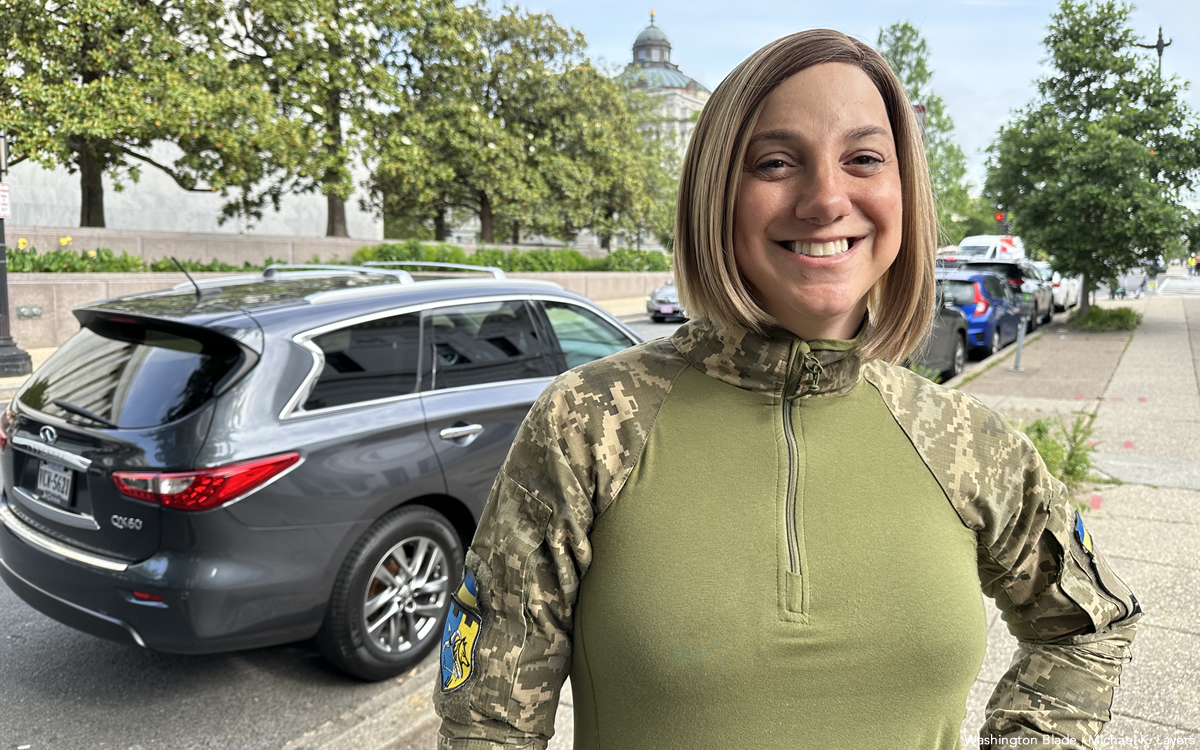
The Armed Forces of Ukraine have named a transgender soldier from the U.S. as one of its English-speaking spokespeople.
The Kyiv Post, an English-language newspaper, last week in a tweet noted Sarah Ashton-Cirillo “has become one of the speakers for the Defense Forces.” Deputy Defense Minister Hanna Malyar is among those who praised Ashton-Cirillo.
“Sara informs the English-speaking audience — she objectively covers the events of the Russian-Ukrainian war, debunks Russian fakes and propaganda,” said Malyar, according to the Kyiv Post. “Sarah’s audience reach on Twitter alone was 28.3 million users. So, the enemies get excited on hateful social networks, of course. However, this has only increased Sarah’s audience.”
Ashton-Cirillo was a journalist when she began to cover the Armed Forces of Ukraine’s Kharkiv Defense Forces at the beginning of Russia’s war against the country in 2022. She eventually enlisted, and a commander from the Defense Ministry on Jan. 31, 2023, facilitated her transfer to the unit’s 209th Batallion of the 113th Brigade.
Ashton-Cirillo, who was born in New York, was working as a senior combat medic in a trench near Kreminna in eastern Ukraine on Feb. 23, 2023, when shrapnel from an enemy artillery shell wounded her. Ashton-Cirillo suffered injuries to her right hand and to her face, and her fellow soldiers had to wait seven hours to evacuate her. Ashton-Cirillo eventually received treatment for her injuries in Kharkiv, Ukraine’s second-largest city that is roughly 130 miles northwest of Kreminna.
The Washington Blade spoke with Ashton-Cirillo in May while she was in D.C.
“The big key there was I wasn’t able to take any painkiller by staying in the trench because I was still technically in battle,” she recalled. “Seven hours after my injury, I finally got to a hospital.”
Ashton-Cirillo on Tuesday told the Blade her “new role within the Armed Forces of Ukraine is a position that has been earned due to my performance on the physical and informational battlefields.”
“What this means is that in today’s Ukraine being a part of the LGBTQ community is neither a benefit nor hindrance, but simply an accepted part of whom a person is,” she said. “The vocal support shown by LGBTQ groups in Ukraine, such as Gender Stream, Kyiv Pride and Ukraine Pride, upon news of this taking place, along with the statement of confidence in me issued by the Ukrainian Ministry of Defense and Deputy Defense Minister Hanna Maliar, made me understand that this battle for the country’s liberation is not about tolerance or acceptance for any one group but freedom and liberty for all Ukrainians.”
-

 Obituary4 days ago
Obituary4 days agoLocal attorney, LGBTQ rights advocate Dale Sanders dies at 75
-

 U.S. Federal Courts3 days ago
U.S. Federal Courts3 days agoFederal judge blocks Trump passport executive order
-

 Mexico4 days ago
Mexico4 days agoGay couple claims Puerto Vallarta wedding venue discriminated against them
-

 Books3 days ago
Books3 days ago‘Pronoun Trouble’ reminds us that punctuation matters









